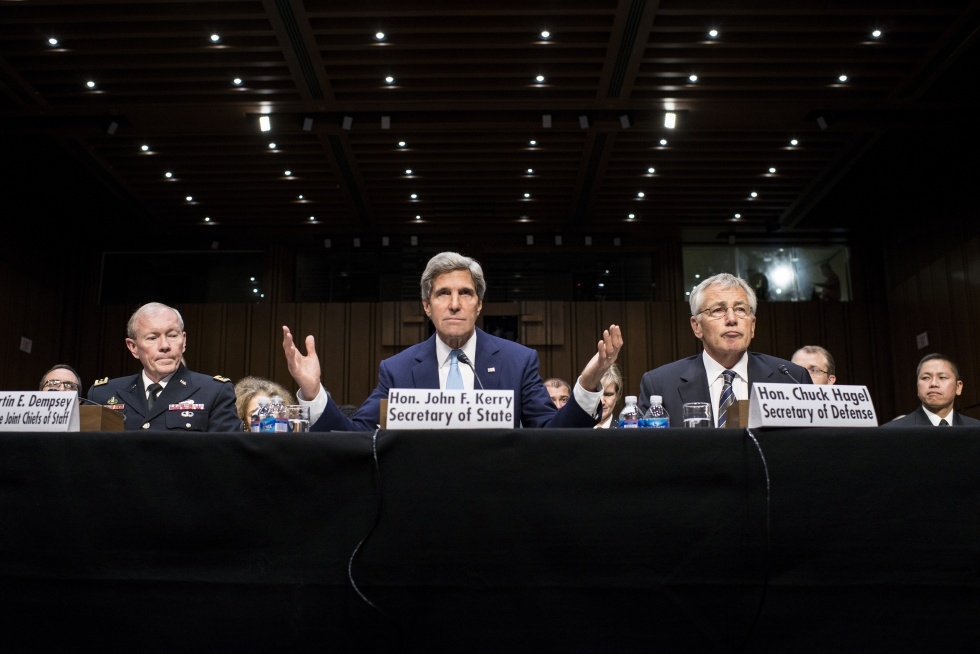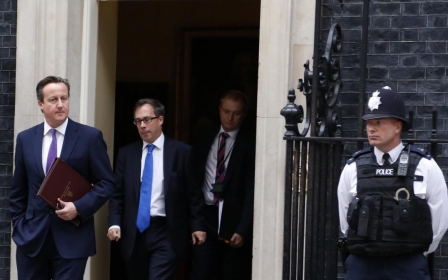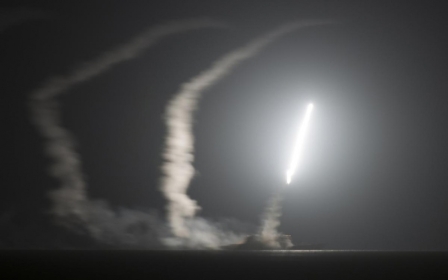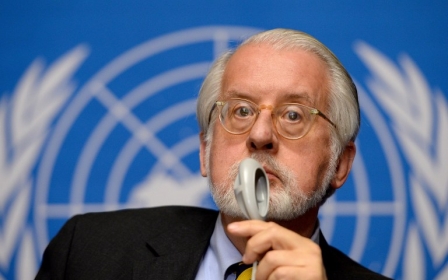Kerry insists US not trying to help Syria's Assad

America's war on Islamic militants is not aimed at helping Syrian President Bashar al-Assad stay in power, US Secretary of State John Kerry insisted Friday.
The top US diplomat sought to dispel wariness that the "laser focus" on fighting Islamic State (IS) militants has distracted from efforts to end the three-year civil war in Syria in which over 200,000 people have been killed, predominately by pro-Assad forces.
Damascus has long insisted that defeating the "terrorists" - which includes the moderate rebels and political dissents - must take precedence over everything else, including negotiations about political reform.
And the Syrian government welcomed the US-led air strikes against IS militants on its territory.
"This campaign is not about helping President Bashar Assad of Syria," Kerry shot back in an opinion piece Friday in the Boston Globe.
"We are not on the same side as Assad -- in fact, he is a magnet that has drawn foreign fighters from dozens of countries to Syria."
"Assad lost legitimacy a long time ago," Kerry stressed.
US efforts to train and equip vetted members of the Syrian opposition to fight IS militants "will promote conditions that can lead to a negotiated settlement that ends this conflict."
But new Iraqi Prime Minister Haider al-Abadi told US reporters on Thursday that he had only backed the air strikes in Syria after being told that pro-Assad forces would not be targeted.
"We had a lengthy discussion with our American friends, and what they emphasized is their aim in Syria is not to destabilize Syria," Abadi said, quoted by the New York Times.
Instead the aim was "to diminish the capability of Daesh," Abadi said, using the Arabic term for IS.
The Iraqi prime minister also said the United States had asked him to send a message via one of his advisors to the Assad government that it would not be a target of the strikes.
US officials have said more than 60 countries are now taking part in the anti-IS coalition, "responding with a unity that shows these criminals that we will not allow them to divide us or force their nihilistic vision on helpless people," Kerry wrote.
He pointed to Wednesday's unanimous and binding resolution demanding that countries take action to stem the flow of foreign militants to Iraq and Syria.
Even Russia, a staunch Assad ally long accused of funnelling funds and weapons to Assad, did not wield its veto during the Security Council.
Russian Foreign Minister Sergei Lavrov said Friday that any action against IS militants in Syria should be in line with international law and "it's very important that such cooperation with Syrian authorities is established."
The fight against IS militants in Syria was raised in "in-depth" talks this week between Kerry and Lavrov, a State Department official confirmed.
"The US and Russia share an interest in defeating the kind of violent extremism that ISIL represents," the senior US official told a small group of reporters.
12,000-15,000 Syrian rebels needed to fight IS
Meanwhile, the top US military officer said Friday that a Syrian rebel force of 12,000 to 15,000 will be needed to defeat Islamic State militants in the country's east, three times the number of fighters due to be trained by the United States.
In offering the estimate, General Martin Dempsey, chairman of the US Joint Chiefs of Staff, said building up a viable rebel force on the ground would be a vital part of pushing back the IS group in Syria -- but warned it would take time and patience.
"We've had estimates anywhere from 12,000 to 15,000 is what we believe they would need to recapture lost territory in eastern Syria," Dempsey told a news conference at the Pentagon.
But he said the current plan for 5,000 recruits to be trained and armed by American instructors was never intended to represent the total number of troops forming the "moderate" rebel forces.
"Five thousand has never been the end state...," he said.
It was the first time Washington had put a number on how big a rebel force might be required to push back the IS in Syria.
The general said defeating the IS group would take more than air power and that "a ground component" was an important aspect of the US-led campaign.
"We believe the path to develop that is the Syrian moderate opposition," he said.
The general said he was "confident" the training effort would be successful but pleaded for patience.
"We have to do it right. Not fast," he said.
"We need to have military leaders that bind them together. They have to have a political structure into which they can hook, and therefore be responsive to. And that's going to take some time."
Air strikes cost $7 million to $10 million a day
The US Congress last week approved President Barack Obama's plan to train and equip up to 5,000 "moderate" rebel troops, and Saudi Arabia has offered to host the training.
Asked who was the head of the opposition that was receiving US assistance, Pentagon Chief Chuck Hagel said there was no leader at the moment as Washington was vetting the recruits.
"We don't have a head of it, in that we are vetting and will continue to vet through our regional partners, State Department, intelligence departments . . .," he said. "We're not going to instruct them as to who their leaders are."
He said a total of 43 US-led air strikes in Syria this week and about 200 in Iraq since August 8 had damaged the IS group but there was a long fight ahead.
"I also want to emphasize that no one is under any illusions -- under any illusions -- that airstrikes alone will destroy ISIL," said Hagel, using an alternative acronym for the group.
"They are one element of our broader comprehensive campaign against ISIL, a campaign that has diplomatic, economic, intelligence and other military components, working with coalition partners and a new government in Iraq."
Hagel also said the cost of the air war for the United States was at about at $7 million to $10 million a day and acknowledged that the Obama administration would have to ask Congress for more funds to cover the operation in coming months.
New MEE newsletter: Jerusalem Dispatch
Sign up to get the latest insights and analysis on Israel-Palestine, alongside Turkey Unpacked and other MEE newsletters
Middle East Eye delivers independent and unrivalled coverage and analysis of the Middle East, North Africa and beyond. To learn more about republishing this content and the associated fees, please fill out this form. More about MEE can be found here.




